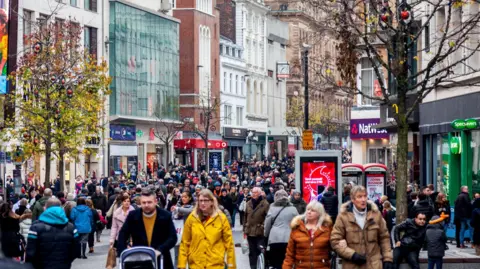The economic landscape in the United Kingdom is currently facing a recalibration of growth forecasts due to heightened uncertainty stemming from trade tariffs imposed by the United States. The prominent economic advisory group, EY Item Club, recently adjusted its predictions, reducing the expected growth rate for the UK economy this year from 1.0% to 0.8%. Additionally, projections for the subsequent year have also been revised downward from 1.6% to 0.9%. This revision highlights ongoing concerns about how these tariffs may hinder economic momentum.
The tariffs in question have instituted a 10% baseline tax on imports from the UK, along with a more substantial 25% tariff on strategic goods such as aluminum, steel, and automobiles. This trade barrier is anticipated to dampen the confidence of both businesses and consumers, ultimately leading to a decline in demand for a variety of goods and services. Such tariffs are not just immediate impediments; they signal a broader nervousness in the market which could stifle economic dynamism.
Business investment is particularly at risk, as uncertainty looms large in the global trading environment. As Anna Anthony, the EY UK & Ireland regional managing partner, emphasizes: “Businesses thrive on certainty.” The unpredictability of current global market conditions directly translates into reduced levels of business investment, potentially impeding progress over the short term. This hesitancy among businesses is compounded by a recent report from the International Monetary Fund (IMF), which has similarly cut its growth forecasts for several major economies, including the UK, now estimating a mere 1.1% growth this year as opposed to earlier predictions of 1.6%.
Moreover, the outlook for UK exports appears grim as various impediments from tariffs mount. The United States remains a pivotal market for the UK, absorbing about 16% of its exported goods and serving as a significant provider of services. The EY Item Club indicates that even slight escalations in trade tensions with the US could indirectly stymie UK growth prospects by undermining the global economy. Chief Economic Adviser to the EY Item Club, Matt Swannell, succinctly pointed out that “US tariffs will act as a drag on UK growth,” predicting a slowdown in economic activity spanning from the second quarter of this year through the early part of the next.
In practical terms, exports from the UK are projected to experience a downturn, with expectations set for a reduction of around 0.5% in 2025 and further falling by 0.4% in 2026. This scenario certainly reflects the significant challenges that the UK economy faces on the international stage, impacted by policies that can shift swiftly and disrupt trading relationships.
Despite these obstacles, the EY report strikes a note of cautious optimism. The service sector, a cornerstone of the UK economy, is anticipated to continue its growth trajectory amidst the broader economic challenges. Furthermore, favorable changes in interest rates are predicted to provide a boost to both household and business expenditure moving forward. EY forecasts that the Bank of England will cut rates from their current levels down to around 3.75% by the year’s end, potentially lowering them even further to 3.5% by February 2026.
In conclusion, although the forecasts indicate a challenging period for the UK economy due to trade uncertainties, particularly regarding US tariffs, there are glimmers of hope in sectors that continue to demonstrate resilience. Inflation is expected to surpass 3% in April and stay elevated for the remainder of the year, with an anticipated decrease to 2.4% by 2026. Stakeholders will need to navigate this environment carefully, balancing optimism with the realities of a complex international economic framework.











